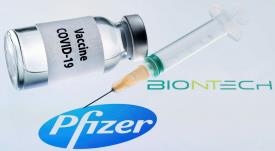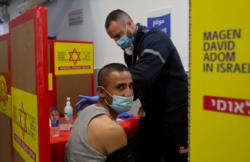 A limited volunteer study in the Republic of South Africa as reported by Pfizer demonstrated that the Pfizer-BioNtech mRNA vaccine BNT162b2 as used in the U.S. was totally effective in protecting against exposure to the B.1.351 variant. This strain emerged in the Republic of South Africa during late 2020 and is now present in the U.S.
A limited volunteer study in the Republic of South Africa as reported by Pfizer demonstrated that the Pfizer-BioNtech mRNA vaccine BNT162b2 as used in the U.S. was totally effective in protecting against exposure to the B.1.351 variant. This strain emerged in the Republic of South Africa during late 2020 and is now present in the U.S.
Of the 800 volunteers divided between the Pfizer vaccine and a placebo, nine cases were recorded in the placebo group and none in the vaccine group. Six of the nine cases yielded B.1.351variant SARS-COVID 2 basically corresponding to the prevalence of this variant in South Africa. Previous studies showed that the AstraZeneca adenovirus vectored vaccine was ineffective against this variant. The results of the limited-scope study are consistent with previous in vitro studies of the protective effect of the Pfizer mRNA vaccine.
 Based on an analysis of 46,307 participants in a Pfizer vaccine trial, Pfizer and their partner BioNtech intends to apply for full authorization as the vaccine is currently administered under emergency use authorization for individuals 16 years of age and older.
Based on an analysis of 46,307 participants in a Pfizer vaccine trial, Pfizer and their partner BioNtech intends to apply for full authorization as the vaccine is currently administered under emergency use authorization for individuals 16 years of age and older.
In the data to be submitted to FDA, Pfizer will document protection extending through six months after the second dose. A total of 850 cases of COVID-19 occurred among the 927 confirmed infections in the placebo group with 77 in the patients receiving the Pfizer vaccine representing a protective efficiency of 91.3 percent with a 95 percent confidence interval ranging from 89.0 percent to 93.2 percent. Among the placebo group, 32 of the cases were regarded as severe following CDC definition and none of the cases among the vaccinates were regarded as severe demonstrating a 100 percent efficacy against severe disease. Efficacy was relatively consistent across age, gender, and ethnicity and with predisposing conditions.
A Saturday April 10th release from epidemiologists in Israel* suggested that the RSA variant B.1.1351 could break through immunity stimulated by a two-dose series of the Pfizer BNT162b2 mRNA vaccine. A sample of 400 vaccinated subjects were sampled with a recovery rate of 5.4 percent of the variant compared to 0.7 percent recovery in a control group of non-vaccinated subjects. The prevalence of the B.1.1351 variant in Israel among sequenced isolates is about one percent. The authors concluded that mass vaccination coupled with lifestyle precautions is adequate to control COVID including the two principal variants of concern (VOCs). It is a matter of record that Israel has vaccinated 80 percent of the population over 16 years of age.
* Kustin, T et al Evidence for increased breakthrough rates of SARS-CoV-2 variants of concern in BNT162b2 vaccinated individuals. medRxiv. doi.org/10.1101/2021.04.06. 21254882.